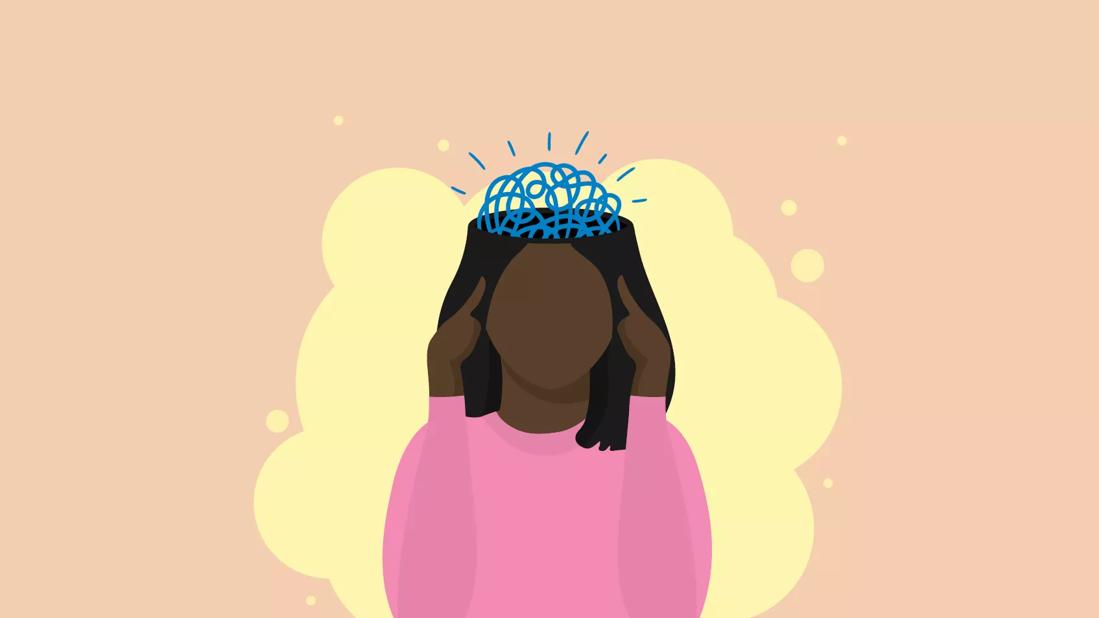Caught in a thinking loop? Here’s how you can change your thought process

Do your thoughts keep you up at night? Do you second-guess every decision you make? Do you imagine worst-case scenarios?
Advertisement
Cleveland Clinic is a non-profit academic medical center. Advertising on our site helps support our mission. We do not endorse non-Cleveland Clinic products or services. Policy
If so, you might be an overthinker.
While you may believe that continuing to think and rethink about things that bother you is problem-solving, this habit of overthinking doesn’t usually provide any resolution.
In fact, overthinking creates more stress by focusing on the negative, dwelling on the past and worrying about your future.
Registered psychotherapist Natacha Duke, MA, RP, talks about whether overthinking is a mental illness and steps you can take to stop overthinking.
No, overthinking isn’t a recognized mental health condition, but it can be a symptom of depression or anxiety.
Overthinking is commonly associated with generalized anxiety disorder (GAD), says Duke. GAD is characterized by the tendency to worry excessively about several things.
“Someone can develop GAD due to their genes. Or it could be personality factors like the inability to tolerate uncertainty in life. And it could be life experiences,” says Duke. “Normally, it’s a combination of all three.”
Those with GAD may experience:
Physical symptoms of GAD can include restlessness, difficulty concentrating and sleep problems.
Advertisement
If you tend to overthink, you might experience the following:
“What happens is a chain effect,” explains Duke. “You’ll start worrying about one thing, and then you’ll be worried about something completely different. You might start worrying about work and then you’ll start worrying about money. And that leads to worrying about losing your job.”
Problem-solving is a great skill to have and can be very productive. It can be easy to believe that all of your worrying and overthinking is actually problem-solving. But there’s a key difference.
“When a problem presents itself, brainstorming possible solutions is a positive coping strategy,” says Duke. “With overthinking, what happens is that you ruminate, which is where you go over and over a problem again and again. But there’s no real resolution. You get caught up in the thinking loop and you end up where you started. In some cases, you may even end up with more worry and anxiety.”
You want to focus on problem-solving what is within your control and practice letting the rest go. Whether you spend 20 minutes or two hours ruminating on a problem, it won’t provide the relief and satisfaction you hope for. So, do your best to recognize when you’re overthinking and distract yourself until you’re ready to tackle the problem in a helpful way.
If you notice yourself overthinking, there are steps you can take to limit your worrying and cope in a healthier way, says Duke.
If you struggle to turn off your thoughts at night or your overthinking is interfering with or affecting your daily life, talking to your doctor or a therapist can help.
“The most effective treatment is cognitive behavioral therapy,” says Duke. Your therapist will work with you to challenge your negative thoughts and develop coping skills that can help alleviate your worrying.
Duke also says that positive coping strategies like meditation, reading or writing down your worries can help lessen your anxiety.
It’s also important to make sure you have adequate social support and that you’re resisting the urge to keep things inside. And don’t forget about engaging in healthy habits like eating a well-balanced diet and exercising.
“Pay attention to how much caffeine or alcohol you consume, as these can increase anxiety,” cautions Duke. “Also, try to avoid having too little or too much downtime and engaging in a lot of social media or news consumption, as these things are also going to feed anxiety.”
Advertisement
Learn more about our editorial process.
Advertisement

Most recommended precautions center around minimizing bruising or swelling

Even one drink can have an impact on your cognitive function leading to slurred speech, blurred vision and impaired memory

Understand who may (and may not) benefit

Lorem ipsum dolor sit amet. Et odio Quis vel ipsam omnis eum alias deleniti et placeat impedit non voluptas galisum hic autem enim et cupiditate aliquid. Est beatae quidem non facilis autem ut commodi nisi aut tempore rerum et dolores voluptatem cum enim optio id sapiente quasi. Ad laboriosam officiis 33 cupiditate sequi ea voluptatum consectetur qui necessitatibus voluptate et quasi doloremque et facere explicabo quo explicabo officia

Seeking help through therapy can be an important step in improving your quality of life when you have UC

Type 2 diabetes isn’t inevitable with these dietary changes

Applying a hot or cold compress can help with pain